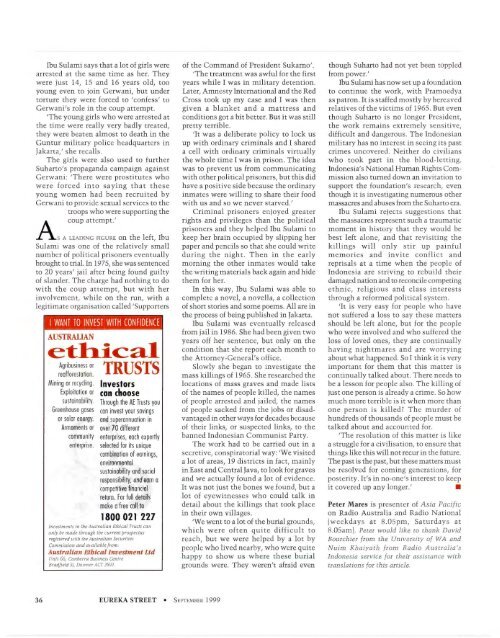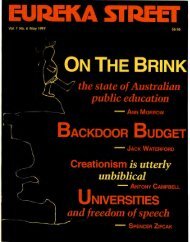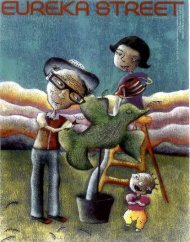1 - Eureka Street
1 - Eureka Street
1 - Eureka Street
- No tags were found...
You also want an ePaper? Increase the reach of your titles
YUMPU automatically turns print PDFs into web optimized ePapers that Google loves.
Ibu Sulami says that a lot of girls werearrested at the same time as her. Theywere just 14, 15 and 16 years old, tooyoung even to join Gerwani, but undertorture they were forced to 'confess' toGerwani's role in the coup attempt.'Th e young girls who were arrested atthe time were really very badly trea ted,they were beaten almost to death in theGuntur military police headquarters inJakarta,' she recalls.The girls were also used to furtherSuharto's propaganda campaign againstGerwani: 'There were prostitutes whowere forced into sayin g that theseyoung women h ad been recruited byGerwani to provide sexual services to thetroops who were supporting thecoup attempt.'AS A LEADING FI G URE on the left, IbuSulam i was one of the relatively smallnumber of political prisoners eventuallybrought to trial. In 1975, she was sentencedto 20 years' jail after being found guiltyof slander. The charge had nothing to dowith t he coup attempt, but with h erinvolvem ent, while on the run, with alegitimate organisation called 'SupportersI I WANT TO INVEST WITH CONFIDENCEAUSTRALIANe-thica.lAgribusiness orreafforesta tion .Mining or recycling.Exploitation orsustain ability.Greenhou se gasesor solar energy.Armaments orcommunityenterprise.TRUSTSInvestorscan chooseThrough the AE Tru sts youcan invest your savingsand superannuation inover 70 differententerprises, each expertlyselected for its uniquecombination of earnings,environmentalsustainability and socialresponsibility, and earn acompetitive financialreturn. For full detailsmake a free call to180002122711ll 1eslments in tbe Austrahan Etbical Trusls ca noil II' be marie through the current prospecl!tSregistered lllitb tbe Australian SecuritiesCommissiou aud C/1'{/i/ab/e.from:Australian. Ethical Investment LtdI 'nil 66. Cauberra Busiuess Centre/3rarl(ield Sf. IJOII'II er ACT 1601of the Command of President Su karno'.'The treatment was awful for the firstyears while I was in military detention.Later, Amnesty International and the RedCross took up my case and I was thengiven a blanket and a mattress andconditions go t a bit better. But it was stillpretty terrible.'It was a deliberate policy to lock usup with ordinary criminals and I shareda cell with ordinary criminals virtuallythe whole time I was in prison. The ideawas to prevent us from communicatingwith other political prisoners, but this didhave a positive side because the ordinaryinmates were willing to share their foodwith us and so we never starved.'Criminal prisoners enjoyed greaterrights and privileges than the politicalprisoners and they helped Ibu Sulami tokeep h er brain occupied by slipping herpaper and pencils so that she could writeduring the night. Then in the earlymorning the other inmates would takethe writing materials back again and hidethem for her.In this way, Ibu Sulami was able tocomplete a novel, a n ovella, a collectionof short stories and som e poem s. All are inthe process of being published in Jakarta.Ibu Sulami was eventually releasedfrom jail in 1986. She had been given twoyears off her sentence, but only on thecondition that she report each m onth tothe Attorney-General's office.Slowly she began to investigate themass killings of 1965. She research ed thelocations of mass graves and made listsof the names of people killed, the namesof people arrested and jailed, the namesof people sacked from the jobs or disadvantagedin other ways for decades becauseof their links, or suspected links, to thebanned Indonesian Communist Party.The work had to be carried out in asecretive, conspiratorial way: 'We visiteda lot of areas, 19 districts in fact, mainlyin East and Central Java, to look for gravesand we actually found a lot of evidence.It was not just the bones we found, but alot of eyewitnesses who could talk indetail about the killings that took placein their own villages.'We went to a lot of the burial grounds,which were often quite difficult t oreach, but we were helped by a lot bypeople who lived nearby, who were quitehappy to show us where these burialgrounds were. They weren't afraid eventhough Suharto had not yet been toppledfrom power.'Ibu Sulami has now set up a foundationto continue the work, with Pramoedyaas patron. It is staffed mostly by bereavedrelatives of the victims of 1965. Bu t eventhough Suharto is no longer President,the work remains extrem ely sensitive,difficult and dangerous. The Indonesianmilitary has no interest in seeing its pastcrimes uncovered. N eith er do civilianswho took part in the bl ood-letting.Indonesia's National Human Rights Commissionalso turned down an invitation tosupport the foundation's research, eventhough it is investigating numerous othermassacres and abuses from the Suharto era.Ibu Sulami rejects suggestions thatthe massacres represent such a traumaticmoment in history that they would bebes t left alone, and that revisiting thekillings will only stir up painfulm em ories and invite conflict andreprisals at a time when the people ofIndonesia are striving to rebuild theirdamaged nation and to reconcile competingethnic, religious and class intereststhrough a reformed political system.'It is very easy for people who havenot suffered a loss to say these mattersshould be left alone, but for the peoplewho were involved and who suffered theloss of loved ones, they are continuallyhaving nightmares and are worryingabout what happened. So I think it is veryimportant for them that this matter iscontinually talked about. There needs tobe a lesson for people also. The killing ofjust one person is already a crime. So howmuch more terrible is it when more thanone person is killed? T h e murder ofhundreds of thousands of people must betalked about and accounted for.'The resolution of this matter is likea struggle for a civilisation, to ensure thatthings like this will not recur in the future.The past is the past, but these matters mustbe resolved for coming generations, forposterity. It's in no-one's interest to keepit covered up any longer. '•Peter Mares is presenter of A sia Pa cificon Radio Australia and Radio National(weekdays at 8.05pm, Saturdays at8.05am ). Peter would lil
















